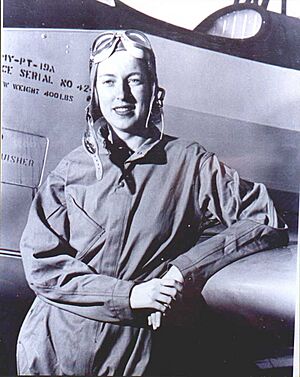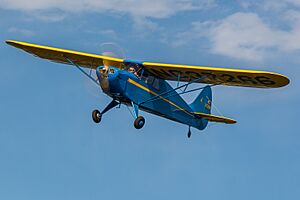Cornelia Fort facts for kids
Quick facts for kids
Cornelia Clark Fort
|
|
|---|---|

Cornelia Clark Fort, resting on her plane
|
|
| Born | February 5, 1919 |
| Died | March 21, 1943 (aged 24) |
| Education | Sarah Lawrence College |
| Occupation | Aviator |
| Years active | 1940–1943 |
Cornelia Clark Fort (born February 5, 1919 – died March 21, 1943) was an amazing American pilot. She is known for two important events in aviation history. First, she was the first U.S. pilot to see the Japanese air fleet during the Attack on Pearl Harbor. This happened while she was teaching someone to fly.
Cornelia and her student barely escaped a mid-air crash. They also avoided being shot at after landing quickly. The next year, she joined the Women Airforce Service Pilots (WASP). On March 21, 1943, she became the first female pilot in American history to die while on duty. This happened during a mid-air collision near Merkel, Texas.
Contents
Early Life and Flying Dreams
Cornelia Fort was born on February 5, 1919. Her family was well-known and wealthy in Nashville, Tennessee. Her father helped start a big insurance company. She went to Ward-Belmont School and then graduated from Sarah Lawrence College in 1939.
After college, Cornelia joined the Junior League of Nashville. She loved flying from a young age. She trained hard and earned her pilot's license in Nashville. She was the second woman in Tennessee to get a commercial pilot's license. She was also the first woman in Tennessee to become a flight instructor. Cornelia taught flying at schools in Colorado and later in Hawaii.
A Pilot's Career
Witnessing the Pearl Harbor Attack
Cornelia Fort was working as a flight instructor in Pearl Harbor, Hawaii. On December 7, 1941, she accidentally became one of the first people to see the Japanese attack. This attack brought the United States into World War II. Cornelia was in the air, teaching a student how to take off and land. They were flying an Interstate Cadet plane.
Her plane and a few other civilian planes were the only U.S. aircraft flying near the harbor. Cornelia saw a military plane flying right at them. She quickly took control and pulled her plane up to avoid it. Then, she saw the rising sun symbol on the plane's wings. Moments later, she saw black smoke rising from Pearl Harbor. Bombers were flying everywhere.
She quickly landed her plane at John Rodgers civilian airport. This airport was near Pearl Harbor. A Japanese Zero plane shot at her plane and the runway as she and her student ran for safety. The airport manager was killed. Two other civilian planes never returned that morning.
Joining the Women's Auxiliary Ferrying Squadron
After the attack, all civilian flights in Hawaii stopped. Cornelia Fort returned to the mainland in early 1942. She made a short movie to help sell war bonds. This movie was very popular and led to many speaking events for her. Later that year, Nancy Love asked Cornelia to join a new group. This group was called the Women's Auxiliary Ferrying Squadron (WAFS). It was the start of the Women Airforce Service Pilots (WASP).
Cornelia was the second woman to join this service. The WAFS pilots flew military planes to different bases across the United States. They helped move planes where they were needed.
A Tragic Loss
Cornelia Fort was stationed at the 6th Ferrying Group base in Long Beach, California. On March 21, 1943, she became the first WAFS pilot to die. She was flying in a group of planes from Long Beach to Love Field in Dallas. The left wing of her BT-13 plane was hit. It was struck by the landing gear of another pilot's plane.
The other pilot, Frank Stamme Jr., was flying too close to Cornelia's plane. He approached her plane and then pulled back. During one of these close passes, the planes collided. The tip of Cornelia's wing broke off, along with six feet of the front edge. The other pilot was able to control his plane. But Cornelia's plane went into a dive she could not stop. It crashed ten miles south of Merkel, Texas. At the time of her accident, Cornelia Fort was one of the most skilled pilots in the WASP program. Her gravestone says, "Killed in the Service of Her Country."
Legacy
Cornelia Fort's story was told in the movie Tora! Tora! Tora!. Actress Jeff Donnell played her. The Cornelia Fort Airpark in East Nashville is named after her.
See also
- Women Airforce Service Pilots (WASP)
- Women Airforce Service Pilots Badge
- United States Army Air Forces
- Women's Army Corps (WAC)
- United States Air Force


